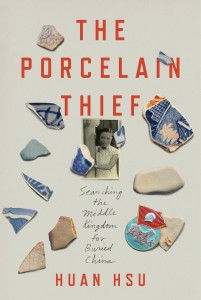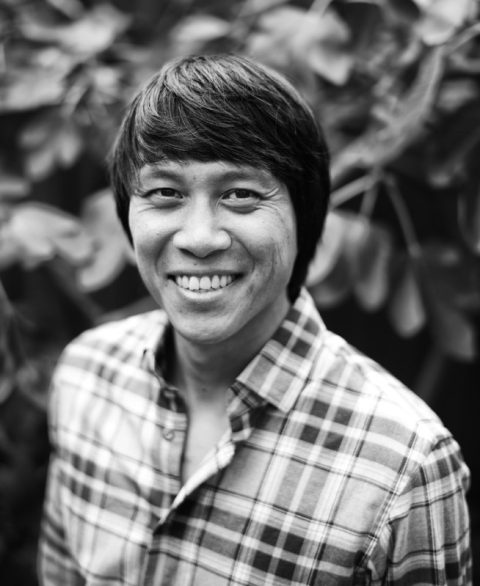Huan Hsu, author of The Porcelain Thief: Searching the Middle Kingdom for Buried China, will be reading submissions December 7-13 2015. In The Porcelain Thief, Hsu blends memoir, travel writing, and history to discuss identity, heritage, and contemporary China.
An anecdote I loved in your interview with NPR about The Porcelain Thief is when you discussed seeing the red porcelain dish in the Seattle Art Museum. It feels like traditional ekphratic writing–at least in fiction, I’m not so sure about the trends in nonfiction– doesn’t happen that much anymore. It was thrilling to me to think about something so old could still inspire new art. What was it like for you as a writer to be so inspired by a chance piece of art? And what advice would you give other writers whose creative starting point is art outside her own?
Usually when I think of how that red porcelain dish inspired me, I focus on how no one at the museum could tell me what was written on it. I’m kind of a completest, so to not have translated what I perceived to be critical information really bothered me, and that, maybe even more than the aesthetics of the dish, was what sent me down the path for my own family’s buried porcelain. But of course there must have been something about its form and color that also drew me to it that is not easily quantifiable. And I guess that’s one piece of advice: to allow yourself to be captivated. I think sometimes the way people approach the craft of writing, especially in MFA programs, can be a little reductive–it is a vocation, you must work at it, you cannot wait for your muse–which has its reasons but can also diminish the fact that the muse does strike sometimes.
And when it does, go ahead and get lost in it before fact-checking yourself. Don’t worry if you don’t know anything about that art. In fact, it’s probably better if you don’t, because the learning process is something to be relished. When I was working for newspapers I wrote a lot about visual art, despite having little training in it as a practitioner or a critic. But I did know about the creative process, and that was what often what gave me entréeinto the story. It’s helpful to remember that there is no one correct way to view or think about or write about the art that inspires you. And I really enjoyed the challenge of making sure the writing would ring true to the experts while engaging a general audience. This goes for both fiction and non-fiction. They go about it in different ways but both are at heart endeavors to get to the truth of something.
That red porcelain dish is also a reminder that there are stories everywhere and there are stories behind everything, and those stories always lead back to the critical ingredient for prose: people. I love that story of how Andre Dubus III wrote The House of Sand and Fog after reading a tiny little brief in the newspaper about a woman who lost her house. While I was working on my book I often joked that if my real-life quest didn’t go anywhere it might be a blessing in disguise, because then I would be free to write it as a novel. So keep your antennae up and keep pushing for answers.
What was your research and writing process like for The Porcelain Thief?
 The research was easy. I moved to China and spent three years living and working and trying to learn what happened to my family’s buried porcelain, and recorded everything I did and heard. I tried to talk to everyone I could and visit every place I could that might offer some clues, not just about my family and its porcelain but also Chinese and porcelain history. The nice thing is that porcelain is so entwined in Chinese culture that just about every place in the country has some kind of interesting porcelain history, which is often inseparable from its social or cultural history. That was also the bad thing, because I’m always terrified of missing out on something so I tend to over-research. It doesn’t help that there is nothing in China that isn’t fascinating. Trying to understand my family’s story in a larger context, I got lost in rabbit holes for weeks at a time–I always asked people if they knew who else I could talk to, and then those people would suggest more people, and so on. Reorienting my life in service of the book would sometimes add a weird layer of meta-experience to things I did or conversations I had.
The research was easy. I moved to China and spent three years living and working and trying to learn what happened to my family’s buried porcelain, and recorded everything I did and heard. I tried to talk to everyone I could and visit every place I could that might offer some clues, not just about my family and its porcelain but also Chinese and porcelain history. The nice thing is that porcelain is so entwined in Chinese culture that just about every place in the country has some kind of interesting porcelain history, which is often inseparable from its social or cultural history. That was also the bad thing, because I’m always terrified of missing out on something so I tend to over-research. It doesn’t help that there is nothing in China that isn’t fascinating. Trying to understand my family’s story in a larger context, I got lost in rabbit holes for weeks at a time–I always asked people if they knew who else I could talk to, and then those people would suggest more people, and so on. Reorienting my life in service of the book would sometimes add a weird layer of meta-experience to things I did or conversations I had.
The writing was more difficult, as writing always is. And writing non-fiction and fiction are different processes, at least for me. I wish I could remember who said this, but I always thought a really apt description for writing fiction is that you’re trying to describe all the contents of a darkened room, and only once you’ve described them perfectly does the light turn on. Non-fiction, on the other hand, is about collecting a critical mass of material, distilling it down to its essence, and then creating and arranging a narrative for it using all the available literary tools–that’s when you can start playing with the language and the storytelling and also when the larger themes and ideas tend to reveal themselves.
The most difficult thing for me was finding the right structure. I avoided all books like the one I was trying to write, both in terms of topic and execution, except when I’d flip through one to remind myself that all writing is just a matter of putting words into sentences, sentences into paragraphs, paragraphs into chapters, and so on. Eventually, I settled on a structure, but I don’t remember it being an epiphany. I think the structure–or a structure–just kind of became apparent after churning through the material over and over. During the writing phase I also did a lot of procrastination by research.
Which stories–and I’m purposefully being vague here because I think this is a question with a lot of interesting wiggle room–do you wish you would see more?
I’m pretty omnivorous when it comes to prose, so I love all stories as long as they’re good. This is probably a homer pick, but I feel like we’re in an extended golden age for narrative non-fiction. You’d think that with all this information at our fingertips that there would be no more undiscovered stories, but every year people are writing fantastic books–and longform literary non-fiction–about real things and people that entertain, inform, and transport me. There are too many examples to list but I can’t talk about narrative non-fiction without mentioning Rebecca Skloot’s The Immortal Life of Henrietta Lacks, which I consider the Platonic ideal of the form.
What’s the most recent great, unforgettable story you’ve read?
I’m a sucker for coming-of-age stories and I have not been able to get Katherine Hill’s Boxwood out of my head since I read it earlier this year. This one gripped me from the start, probably because, like the protagonist, Sarah, I was also the tennis-playing progeny of an academic and I remember those first boring days of summer vacation so fondly. But this story isn’t just accessible and nostalgic. I’ve always thought great fiction reads like memoir, and so much about Boxwood rings true that it’s easy to forget that it didn’t actually happen. Hill so evocatively captures that pregnant feeling of being wracked by unspecific desire and the compulsion to test boundaries without quite knowing what lies beyond, and the dizzying possibilities of a suddenly much larger world that Sarah is just beginning to learn how to navigate. The story also manages to transcend cliche and preserve the spontaneity in the inevitable moment of change–it feels both natural and earned. Perfectly executed and a terrific model for writers struggling with flat or passive protagonists.


 The SmokeLong Grand Micro Contest (The Mikey) is now an annual competition celebrating and compensating the best micro fiction and nonfiction online.
The SmokeLong Grand Micro Contest (The Mikey) is now an annual competition celebrating and compensating the best micro fiction and nonfiction online.